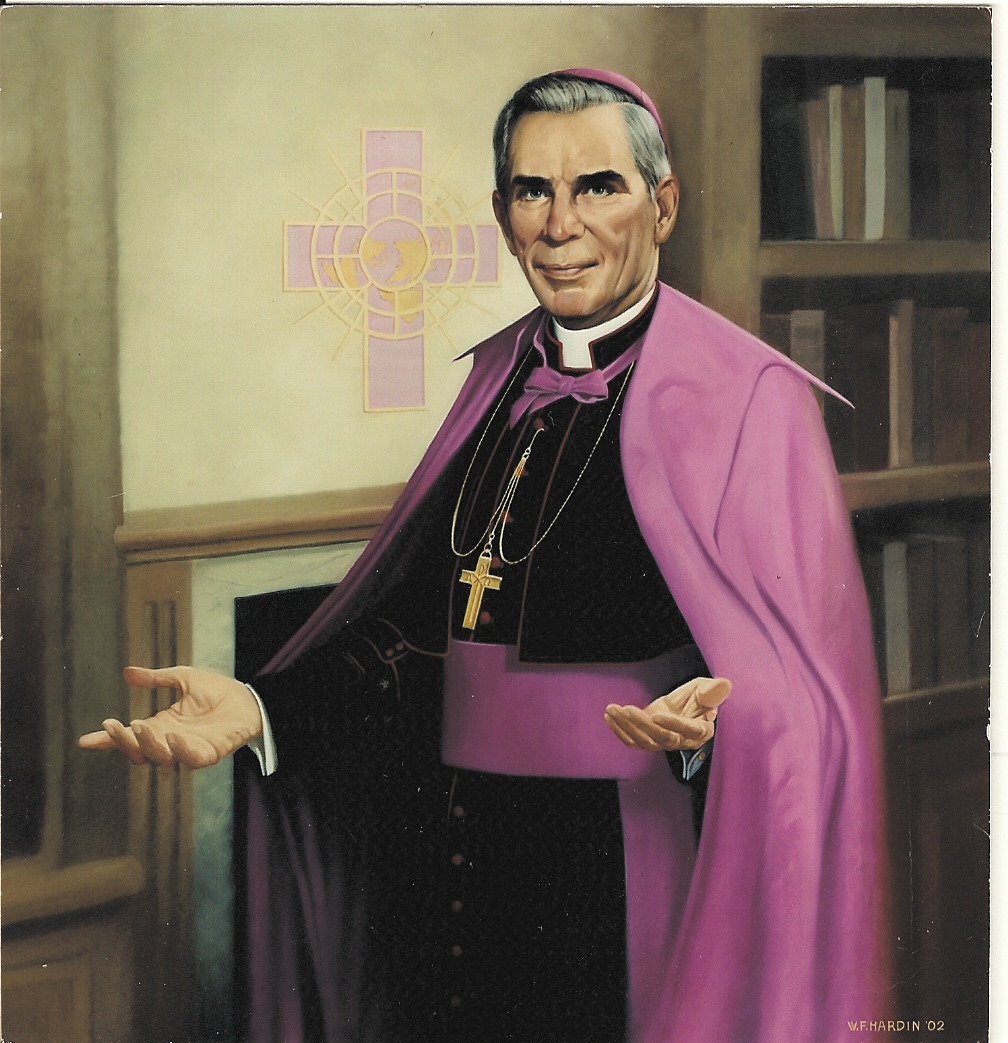Life, Truth, Love, states Ven. Fulton J. Sheen, are what we find in heaven. The soul who hates those would be tormented in heaven and that soul, who has chosen over and over Death, Deceit and Hate, wants to be in hell.
Sad, is it not? Sheen's talk on hell must have disturbed his audience, reminding them that all humans have free will. The justice of God is merely an acknowledgment of a human's own choices.
Sheen writes that justice forces those who hate God to love His Justice in hell, and that is part of the punishment. The Archbishop states that hell is hating those things one loves. I cannot imagine such unhappiness. One could, therefore, hate one's self for all eternity.
Secondly, Sheen notes that hell is being angry with one's self for choosing evil instead of good. The third point he makes is the one about justice. All humans have free will in this life, but the justice of God determines one's will after death and judgement.
I truly wish more priests would talk about hell from the pulpit. Not enough people fear God. Too many people love their own wills more than God.
And, here is St. Teresa of Avila's great vision of hell.
"While I was at prayer one day, I found myself in a moment, without knowing how, plunged apparently into Hell. I understood that it was Our Lord's will that I should see the place which the devils kept in readiness for me, and which I had deserved by my sins. It lasted but for a moment, but it seems to me impossible that I should ever forget it even if I were to live many years.
"The entrance seemed to be by a long narrow pass, like a furnace, very low, dark, and close. The ground seemed to be saturated with water, mere mud, exceedingly foul, sending forth pestilential odors, and covered with loathsome vermin. At the end was a hollow place in the wall like a closet, and in that I saw myself confined. All this was ever pleasant to behold in comparison with what I felt there. There is no exaggeration in what I am saying.
"But as to what I then felt, I do not know where to begin if I were to describe it; it is utterly inexplicable. I felt a fire in my soul but such that I am still unable to describe it. My bodily sufferings were unendurable. I have undergone most painful sufferings in this life, and, as the physicians say, the greatest that can be borne, such as the contraction of my sinews when I was paralyzed, without speaking of other ills of different types - yet, even those of which I have spoken, inflicted on me by Satan; yet all these were as nothing in comparison with what I then felt, especially when I saw that there would be no intermission nor any end to them.
"These sufferings were nothing in comparison with the anguish of my soul, a sense of oppression, of stifling, and of pain so acute, accompanied by so hopeless and cruel an infliction, that I know not how to speak of it. If I say that the soul is continually being torn from the body it would be nothing - for that implies the destruction of life by the hands of another - but here it is the soul itself that is tearing itself in pieces. I cannot describe that inward fire or that despair, surpassing all torments and all pain. I did not see who it was that tormented me, but I felt myself on fire, and torn to pieces, as it seemed to me; and I repeat it, this inward fire and despair are the greatest torments of all.
"Left in that pestilential place, and utterly without the power to hope for comfort, I could neither sit nor lie down; there was no room. I was placed as it were in a hole in the wall; and those walls, terrible to look on of themselves, hemmed me in on every side. I could not breathe. There was no light, but all was thick darkness. I do not understand how it is; though there was no light, yet everything that can give pain by being seen was visible.

"Our Lord at that time would not let me see more of Hell. Afterwards I had another most fearful vision, in which I saw the punishment of certain sins. They were the most horrible to look at, but because I felt none of the pain, my terror was not so great. In the former vision Our Lord made me really feel those torments and that anguish of spirit, just as if I had been suffering them in the body there. I know not how it was, but I understood distinctly that it was a great mercy that Our Lord would have me see with my own eyes the very place from which His compassion saved me. I have listened to people speaking of these things and I have at other times dwelt on the various torments of Hell, though not often, because my soul made no progress by the way of fear; and I have read of the diverse tortures, and how the devils tear the flesh with red-hot pincers. But all is as nothing before this: It is a wholly different matter. In short, the one is a reality, the other a description; and all burning here in this life is as nothing compared with the fire that is there.
"I was so terrified by that vision - and that terror is on me even now as I write - that though it took place nearly six years ago, the natural warmth of my body is chilled by fear even now when I think of it. And so, amid all the pain and suffering which I may have had to bear, I remember no time in which I do not think that all we have to suffer in this world is as nothing. It seems to me that we complain without reason. I repeat it, this vision was one of the grandest mercies of God. It has been to me of the greatest service, because it has destroyed my fear of trouble and of the contradictions of the world, and because it has made me strong enough to bear up against them, and to give thanks to Our Lord who has been my Deliverer, as it now seems to me, from such fearful and everlasting pains.

"Ever since that time, as I was saying, everything seems endurable in comparison with one instant of suffering such as those I had then to bear in Hell. I am filled with fear when I see that, after frequently reading books which describe in some manner the pains of Hell, I was not afraid of them, nor made any account of them. Where was I? How could I possibly take any pleasure in those things which led me directly to so dreadful a place? Blessed forever be Thou, O my God! And oh, how manifest is it that Thou didst love me much more than I did love Thee! How often, O Lord, didst Thou save me from that fearful prison! And how I used to get back to it contrary to Thy will.
"It was that vision which filled me with very great distress which I felt at the sight of so many lost souls, especially of the Lutherans - for they were once members of the Church by Baptism - and also gave me the most vehement desires for the salvation of souls; for certainly I believe that to save even one from those overwhelming torments, I would willingly endure many deaths. If here on earth we see one whom we specially love in great trouble or pain, our very nature seems to bid us compassionate him; and if those pains be great, we are troubled ourselves. What, then, must it be to see a soul in danger of pain, the most grievous of all pains, forever? It is a thought no heart can bear without great anguish. Here we know that pain at last ends with life, and that there are limits to it, yet the sight of it moves us so greatly to compassion; that other pain has no ending, and I know not how we can be calm when we see Satan carry so many souls daily away.

"This also makes me wish that, in a matter which concerns us so much, we did not rest satisfied with doing less than we can do on our part - that we left nothing undone. May Our Lord vouchsafe to give us His grace for that end." http://www.tldm.org/News8/realityofhell.htm






